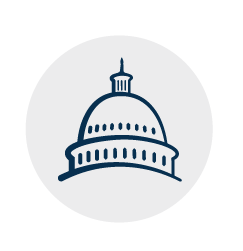More Housing Legislation Rolling into Autumn
On the heels of both OB3 (LIHTC expansion) and the Senate Banking bill “The ROAD to Housing Act”, Congressmen Mike Flood (R-NE) and Emmanuel Cleaver (D-MO), the Chair and Ranking Member of the Housing subcommittee within the Financial Services Committee, introduced a bill this week to amend the Cranston-Gonzalez National Affordable Housing Act to encourage expansion of the supply of decent, safe, sanitary, and affordable housing, with primary attention to rental housing, and for other purposes.
This bipartisan bill is named the 'HOME Reform Act of 2025'. It will address regulatory issues that have been driving up the cost to produce housing.
We have been working with staff on the outline since early this year, and we are excited about the many forward-thinking provisions for both the HOME program, regulatory reforms, and workforce housing.
Congressman Flood said on Wednesday that he ideally wants to hold an October markup of bipartisan housing legislation, including an affordable housing block grant program, which would kick off a broader push for housing legislation in the lower chamber.
It adds 'workforce-income families' to the purpose section of Cranston-Gonzalez to clarify that the program’s focus should shift from solely low-income housing to both low-income and workforce housing.
It enables participating jurisdictions to invest in single-family homeownership assistance that benefits low-income workforce families.
It allows for housing for homeownership that a workforce-income family occupies to qualify as affordable housing under the statute.
It adjusts resale restrictions for single-family homes that receive HOME assistance to be open to workforce-income homebuyers.
It makes other technical changes clarifying that uses of HOME dollars for single-family homeownership investment or repair are open to workforce-income families.
The bill also addresses what Chairman Flood calls the four-horsemen of the housing apocalypse: Davis-Bacon requirements, Section 3 requirements, NEPA (environmental reviews), and BABA (Build America, Buy America).
The HOME Bill raises the threshold at which Davis-Bacon labor requirements would apply to a construction project from 12 units to 50 units.
It changes the cost threshold for Section 3 compliance to a units produced trigger of 50 units.
It exempts developments that are utilizing HOME funds from triggering BABA requirements.
It eliminates NEPA reviews for most developments that utilize HOME funds.
We look forward to the markup in the coming weeks and will report on this and other housing-related bills in the House as they move forward.
While the political divide in Washington continues to thwart bipartisan cooperation in so many policy areas, affordable housing once again bucks that trend. As we approach what appears to be a shutdown of the government on October 1st, we encourage you to continue highlighting the affordable housing challenges you face with your representatives, as well as your advocacy that has benefited our programs.

